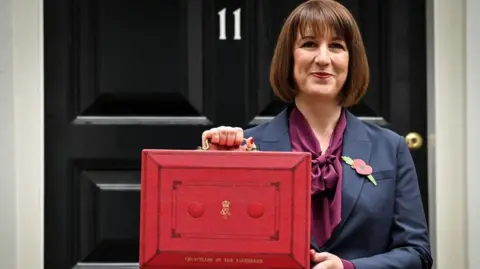Faisal Islam & Michael RaceEconomics editor & Business reporter, BBC News
 Getty Images
Getty ImagesThe Budget will be take place on Wednesday 26 November, the chancellor has announced.
Rachel Reeves confirmed the date that she will outline the government’s taxation and spending plans to pay for things such as hospitals, schools, the military and the police.
It comes as the chancellor faces mounting pressure to balance the public finances, while trying to boost economic growth and maintain the confidence of investors on financial markets.
Economists have warned tax rises or spending cuts must be made if Reeves is to maintain her borrowing rules, given growth has been sluggish and inflation, the rate at which prices rise, has been increasing.
Announcing the date, Reeves said the UK economy “isn’t broken”, but admitted it was “not working well enough for working people”.
“Bills are high. Getting ahead feels tougher. You put more in, get less out. That has to change,” she said.
Labour pledged in its election manifesto to not increase taxes on “working people”, which included VAT, National Insurance (NI) and income tax.
At the Budget last year, the chancellor increased the amount of NI employers have to pay, which led to a backlash from many businesses and sectors, such as hospitality.
Given the government’s pledges, speculation has grown over what taxes Reeves could increase, which suggestions ranging from a windfall tax on the profits of banks to various property taxes or reforming the council tax system.
And with long-term borrowing costs reaching their highest level since 1998, it is getting increasingly expensive to service government debt, eating up what little financial buffer – about £10bn – the chancellor has.
Reeves confirmed she has instructed the government’s independent forecaster, the Office for Budget Responsibility (OBR) to begin the 10-week process of producing a new economic forecast based on her policies for the end of November.
The OBR’s assessment of the government’s plans is seen as a key factor in ensuring financial markets remain stable and investors, who typically loan the UK money, maintain confidence in the UK economy.
The reports of various policy plans have led to uncertainty in recent weeks and some economists had suggested the government should end uncertainty over possible changes with a fast turnaround Budget in October.
Instead the government will take two and a half months to decide the detail of what is expected to be a tax-raising and reforming statement.
‘More to do’
Reeves said the UK had “huge potential” and that her “mission” in the last year was “fixing the foundations” of the economy.
She highlighted that the government had increased the minimum wage, cut NHS waiting times and had begun reforming the planning system it hopes will lead to 1.5 million homes being built in England.
“But I’m not satisfied. There’s more to do,” she sais. “Cost of living pressures are still real.
“And we must bring inflation and borrowing costs down by keeping a tight grip on day to day spending through our non-negotiable fiscal rules.
“It’s only by doing this can we afford to do the things we want to do. If renewal is our mission and growth is our challenge. Investment and reform are our tools.”
Treasury sources said the end of November was in line with typical timing for an Autumn budgetary statement, and that it left time for the “full process” involving the OBR.
The first stage is for the OBR to deliver a new baseline forecast for the UK later this month, which will incorporate a critical new assessment of long-term productivity.
This move alone could open up a difficult hole in the public finances, on top of existing announced U-turns on welfare cuts, and the impact of higher government borrowing costs.
The OBR will tell the Treasury how much taxes will have to rise by or spending will have to be cut by in order to meet the chancellor’s borrowing rules.
The government will then outline likely measures to the forecasters who will assess how much they are forecast to raise or to cost the exchequer.
Reeves has two rules on government borrowing, which she has repeatedly said are “non-negotiable”. These are:
- day-to-day government costs will be paid for by tax income, rather than borrowing by 2029-30
- to get debt falling as a share of national income by the end of this parliament in 2029-30
Last month, the independent National Institute for Economics and Social Research think tank said that the overall gap in the public finances could reach as much as £50bn a year.
It pointed to the need to re-establish what it calls “a large buffer” for Reeves to avoid missing her self-imposed borrowing rules.
In recent days long-term borrowing costs across the world have increased, amid concerns about political uncertainty, levels of debt, and a structural shift in pension funds away from such bonds.
The chancellor will have to balance the books, produce a set of policies that will pass her backbenchers and also promote reforming policies that help jump start sluggish growth.


